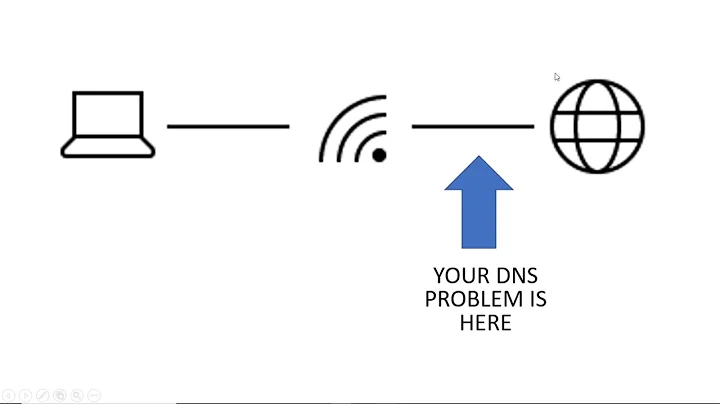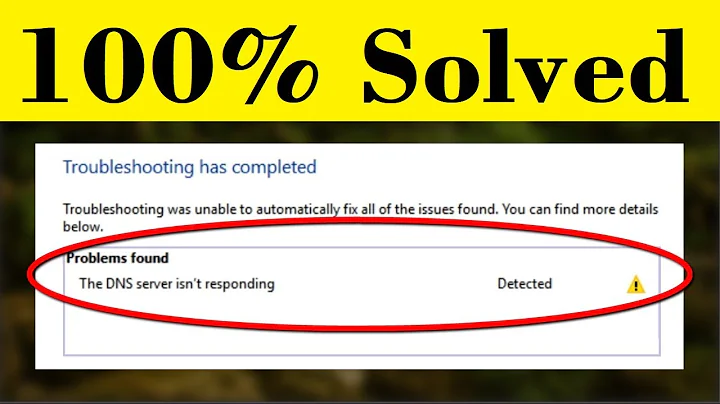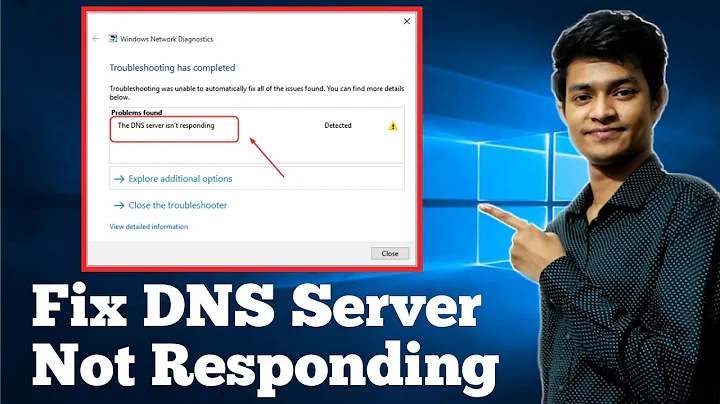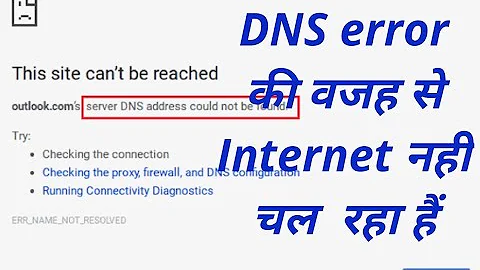DNS Not Working
Solution 1
before anything test that you can actually resolve without configuration setup.
Try the following:
#nslookup
>server 8.8.8.8
>google.com
if that works make sure that your resolv.conf file contains the following:
nameserver 8.8.8.8
It might be that NetworkManager is running also, and that overrides manual changes
Solution 2
A work around to solve this is to temporarily add the domains you need to the /etc/hosts file.
That provided enough connectivity to sudo aptitude to resolve the broken dependencies on the system.
After the upgrade, Ubuntu rebooted normally and I could remove the static IPs from the hosts file again.
I used the following to capture the domains I needed to update and put them into a text file:
sudo apt-get update >> domains.txt
I used the following to grab the IPs I needed:
sh domain-nslookup.sh >> apt-domains.txt
The following is the sh file I created and saved as domain-nslookup.sh:
#!/bin/sh
for DOM in `cat ./apt-domains.txt`;
do
nslookup $DOM 8.8.8.8 |gawk -F": " '/Address/{print $2}'
printf "\t%-4s" $DOM
done
printf "\n"
After verifying that it worked as planned, I added the IPs and domains to the hosts file:
sudo sh domain-nslookup.sh >> hosts
Related videos on Youtube
Learner_seeker
Updated on September 18, 2022Comments
-
Learner_seeker over 1 year
i have a very sparse data set - below is a example of the format. I want to make changes to specific columns based on the logic explained below
# create dummy data set pb=c('1','0','0','0','0','1','Not_ans','1','0','Not_ans') qa=c('1','1','0','0','1','0','Not_ans','1','Not_ans','Not_ans') #zy=c('1','Not_ans','0','1','Not_ans','0','1','1','1','Not_ans') #sub questions for pb pb.abr=c('1','0','0','0','0','1','0','1','0','0') pb.ras=c('0','0','0','0','1','0','0','1','0','0') pb.sfg=c('1','0','0','0','0','0','0','1','0','0') #sub questions for qa qa.fgs=c('1','0','0','0','0','0','0','1','0','0') qa.sdf=c('0','1','0','0','0','0','0','0','0','0') qa.tyu=c('0','0','0','0','1','0','0','1','0','0') df=data.frame(pb,qa,pb.abr,pb.ras,pb.sfg,qa.fgs,qa.sdf,qa.tyu) df pb qa pb.abr pb.ras pb.sfg qa.fgs qa.sdf qa.tyu 1 1 1 1 0 1 1 0 0 2 0 1 0 0 0 0 1 0 3 0 0 0 0 0 0 0 0 4 0 0 0 0 0 0 0 0 5 0 1 0 1 0 0 0 1 6 1 0 1 0 0 0 0 0 7 Not_ans Not_ans 0 0 0 0 0 0 8 1 1 1 1 1 1 0 1 9 0 Not_ans 0 0 0 0 0 0 10 Not_ans Not_ans 0 0 0 0 0 0The two columns pb and qa are called base columns, and they have further sub columns for with naming convention as pb. and qa. - so we see three sub columns for pa and 3 for qa. I want to make changes to these sub columns based on a condition to the base column ( pa or qa) .
Condition is if column
pb =='Not_ans'then make all sub columns (pb.abr,pb.ras and pb.sfg) = 'Not_applicable'how do i write a function which achieves this? where i specify the base column name i.e.
pband naming of sub columns example'pb.'below - would it be something like below but it wont give the resultdata.frame(ifelse(df['base_q']=='Not_ans', df[ , grepl( paste('base_q','.') , names(df) )]=='Not_applicable',df[,grepl( paste('base_q','.') , names(df)) ])How do i write a generic function which takes the base column numbers as inputs for example 1,2 here - applies the function i.e whereever pb is Not_ans it changes sub_columns ( pb.abr,pb.ras,pb.sfg) to Not applicable and then moves to column 2 ( qa) and applies the same logic?
-
tsmith18256 over 9 yearsSo this just worked perfectly, thank you very much. Any chance you can explain why this worked, but when I put the following in resolv.conf it failed? nameserver 8.8.8.8 nameserver 8.8.4.4
-
Alex Austin over 9 yearscan you paste the content of your resolv.conf?
-
 chili555 over 9 yearsAccording to the man page, the preferred format is: dns-nameservers 8.8.8.8 8.8.4.4
chili555 over 9 yearsAccording to the man page, the preferred format is: dns-nameservers 8.8.8.8 8.8.4.4 -
Anders over 9 yearsI like the command
getent hosts www.google.com. The commandgetentuses the systems way of looking up names.nslookupor ` dig` uses only the DNS system. Also look up the manual page forresolvconf. That is what is using thedns-nameservesdirective in/e/n/interfacesand other DNS sources to manipulate/e/resolve.conf. So if the packageresolveconfis installed, never change the contents of/e/resolv.confmanually. Use the command. -
guntbert over 9 yearscareful! replacing the content of
/etc/resolv.conf(which is a symlink actually) will break the packageresolvconv. So don't recommend that without further inquirements. -
Jakuje over 8 yearsexample would not hurt, isn't it?
-
jfl over 8 yearsedited with example and steps.
-
Learner_seeker about 5 yearsHi above solution works - but then do i use an lapply to apply it of the number of columns. Like in above data frame - i show two base columns but in my orignal data frame i have 100s of base question columns and 1000+s sub question columns. Naming convention follows as ('baseQ+".") but not for all. Would it make sense to have the function instead with input - base question column numbers & naming logic of sub questions
-
Learner_seeker about 5 yearsagain, do i use
lapplyto apply it over a multiple number of base q columns? -
 jazzurro about 5 years@Pb89 You do not have to use
jazzurro about 5 years@Pb89 You do not have to uselapply(). Basically, you are applying if_else() to all columns that begins with "pb.". -
Learner_seeker about 5 yearsNo I meant with this I would have to run the code for pb and then again for qa. How do I apply this mutate to both column 1,2 which end up changing the sub cols of pb and qa
-
 jazzurro about 5 yearsThen, you can run mutate one more time. In the 2nd time, you change column names. So it would be something like
jazzurro about 5 yearsThen, you can run mutate one more time. In the 2nd time, you change column names. So it would be something likemutate_at(vars(contains("qa.")), .funs = funs(ifelse(qa == "Not_ans", "Not_applicable",.))) -
Learner_seeker about 5 yearsLike I mentioned if it was 2 columns, would have done that. But I have 100s of columns like pb and qa. And can't apply it one by one to all
-
 BENY about 5 years@Pb89 if you know your base columns you can just apply it just need to modify the function with for loop in it
BENY about 5 years@Pb89 if you know your base columns you can just apply it just need to modify the function with for loop in it -
 jazzurro about 5 years@Pb89 It would be great if you would have mentioned such a detail in your original question.
jazzurro about 5 years@Pb89 It would be great if you would have mentioned such a detail in your original question. -
Learner_seeker about 5 yearsSorry if I wasn't clear but the last paragraph of the original questions does say a function with column numbers as inputs and applies the logic to all.
-
John Baber-Lucero almost 4 yearsThe script didn't quite work for me, but this is a good reminder that while I'm solving my DNS problem, setting up /etc/hosts with what apt wants makes things a lot easier. Thanks!




